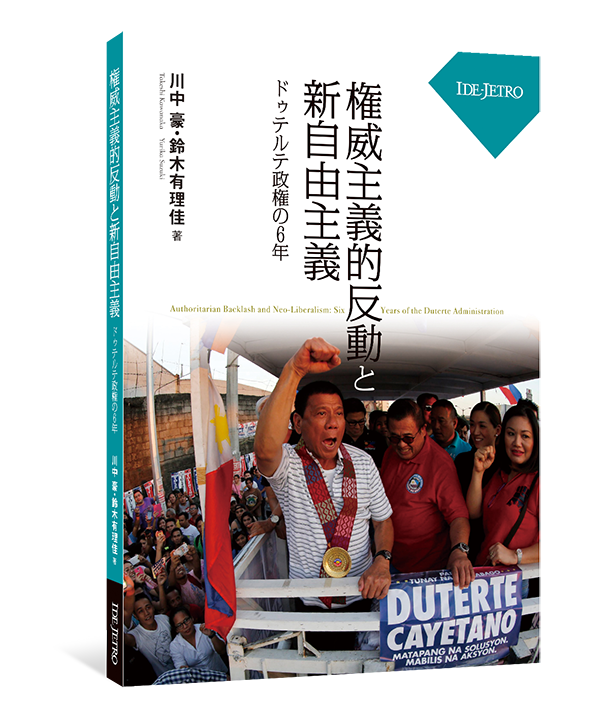Japanese eBooks
eBook

Authoritarian Backlash and Neo-Liberalism: Six Years of the Duterte Administration
Authors/Editors
Takeshi Kawanaka, Yurika Suzuki
Publication date
December 2023
ISBN
978-4-258-04658-4
Download eBook for free
Available in EPUB and PDF format for full book. EPUB files can be opened in eBook readers.
Buy the print-on-demand book
About this book
About this book
President Rodrigo Duterte, who held power in the Philippines for six years between 2016 and 2022, drastically shifted Philippine foreign policy from its previous pro-U.S. stance to a pro-China one. Domestically, he also violently enforced drug control policies, ignoring the judicial process. At the same time, he left the formulation and implementation of economic policies entirely to technocrats who promoted neoliberal policies, and he did not actively take the initiative in advancing social policies. The Duterte administration pushed for significant changes in the political and diplomatic spheres while strengthening the economic and social spheres in terms of the Philippines' post-democratization agenda of strengthening democracy and the rule of law and ensuring neoliberal competition. This book seeks to clarify the significance of the Duterte administration for the Philippines in the post-democratization era by describing its political, economic, social, and diplomatic features. This book will also provide clues to understanding the background behind the administration's emergence, particularly the political and economic challenges facing the post-democratization Philippines. In this way, this work will explore where the Philippines is headed in the future and will contribute to the understanding of emerging democracies facing similar difficulties.
Contents
Preface
Chapter 1 Politics: Authoritarian Backlash
Chapter 2 Economy: Deepening Neoliberalism
Chapter 3 Society: Passive Steps Toward the Welfare State
Chapter 4 Foreign Relations: Between the U.S. and China
Conclusion
Preface
Preface
In October 2016, not long after his administration came to power in the Philippines, President Rodrigo Duterte visited Japan. The visit was reported on daily, making him the first Philippine president in a long time to be widely covered by the Japanese media.
The reason is easy to understand. The Philippines had been pro-U.S. and pro-Japan and had strongly opposed China's encroachment into the South China Sea, but Duterte drastically changed this diplomatic stance, declaring a review of relations with the U.S. and rapidly moving closer to China. Concerns were raised that this could significantly affect Japan's position in Asia.
In addition, the Duterte administration's violent crackdown on drugs in the country was seen as a serious problem. Needless to say, the president's blatant disregard for judicial procedures in a country that espouses democracy was shocking. Coupled with this, the president's personal statements, many of which were radical, provided ample material for the media.
However, the focus on Duterte himself, due to the eccentricity of his words and deeds, has led to only partial attention being paid to the impact of structural problems and institutional features of the Philippine political economy. While the focus on the president's personality is easy to understand, the complex realities of the situation are sidelined.
This book, therefore, attempts to provide a broader overview of the situation that the Philippines has faced since its democratization in 1986 by looking at the Duterte administration. The fact that the Duterte administration came to power and has maintained a high approval rating largely reflects the characteristics of the Philippine political economy. We aim to identify these features.
This publication is the product of a research project entitled "Authoritarian Backlash and Neoliberalism: Six Years of the Duterte Administration" (Organizer: Takeshi Kawanaka) conducted by the Institute of Developing Economies (IDE) in FY2021-2022. It was partially supported by JSPS Grants-in-Aid for Scientific Research JP20K01466 and JP19H00582. We would like to express our gratitude to everyone who supported this project, including our colleagues at the Institute of Developing Economies.
August 2023
Authors


